The SSD Anthology: Understanding SSDs and New Drives from OCZ
by Anand Lal Shimpi on March 18, 2009 12:00 AM EST- Posted in
- Storage
PCMark Vantage
Next up is PCMark Vantage, another system-wide performance suite. For those of you who aren’t familiar with PCMark Vantage, it ends up being the most real-world-like hard drive test I can come up with. It runs things like application launches, file searches, web browsing, contacts searching, video playback, photo editing and other completely mundane but real-world tasks. I’ve described the benchmark in great detail before but if you’d like to read up on what it does in particular, take a look at Futuremark’s whitepaper on the benchmark; it’s not perfect, but it’s good enough to be a member of a comprehensive storage benchmark suite. Any performance impacts here would most likely be reflected in the real world.
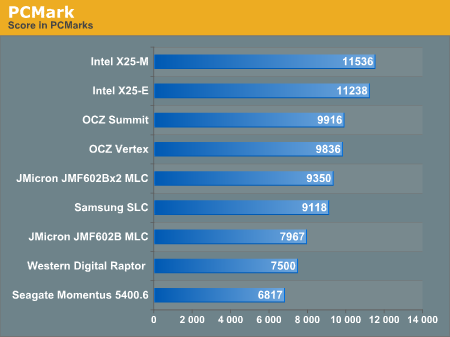
If you've paid attention to the synthetic tests from the previous pages, the results here should make sense. The Intel drives take the top two spots followed by the two OCZ drives, then the JMicron and conventional HDDs take up the rear.
While PCMark does do a great job of measuring disk performance, it doesn't seem to stress random write performance as much, allowing the JMicron drives to relax a bit.
Now let's look at the individual test suites:
The memories suite includes a test involving importing pictures into Windows Photo Gallery and editing them, a fairly benign task that easily falls into the category of being very influenced by disk performance.
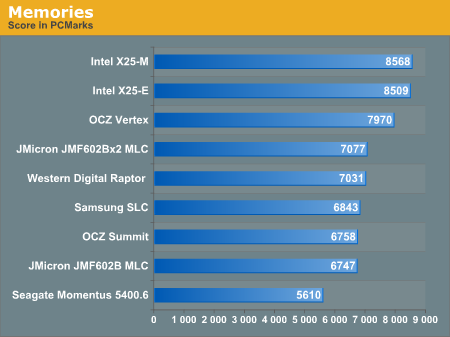
The TV and Movies tests focus on on video transcoding which is mostly CPU bound, but one of the tests involves Windows Media Center which tends to be disk bound.
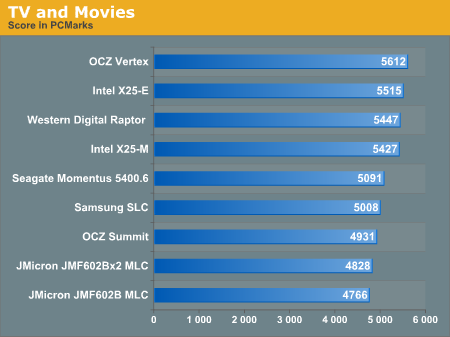
SSDs won't always dominate and in many cases they won't offer tangible improvements over a fast hard drive.
The gaming tests are very well suited to SSDs since they spend a good portion of their time focusing on reading textures and loading level data. All of the SSDs dominate here, but as you'll see later on in my gaming tests the benefits of an SSD really vary depending on the game. Take these results as a best case scenario of what can happen, not the norm.
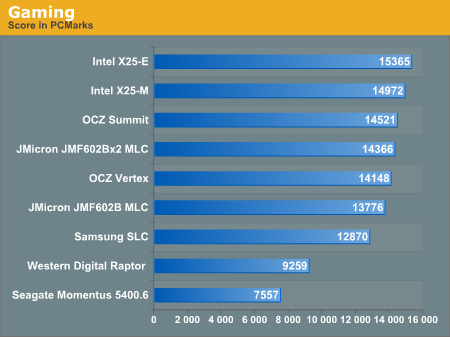
In the Music suite the main test is a multitasking scenario: the test simulates surfing the web in IE7, transcoding an audio file and adding music to Windows Media Player (the most disk intensive portion of the test).
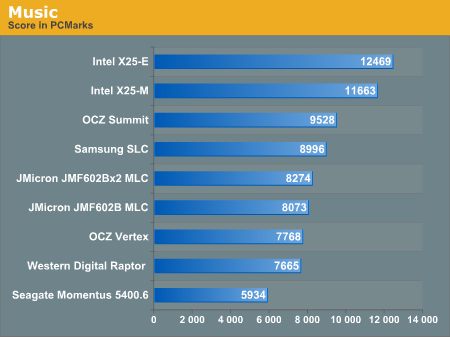
The Communications suite is made up of two tests, both involving light multitasking. The first test simulates data encryption/decryption while running message rules in Windows Mail. The second test simulates web surfing (including opening/closing tabs) in IE7, data decryption and running Windows Defender.

I love PCMark's Productivity test; in this test there are four tasks going on at once, searching through Windows contacts, searching through Windows Mail, browsing multiple webpages in IE7 and loading applications. This is as real world of a scenario as you get and it happens to be representative of one of the most frustrating HDD usage models - trying to do multiple things at once. There's nothing more annoying than trying to launch a simple application while you're doing other things in the background and have the load take seemingly forever.
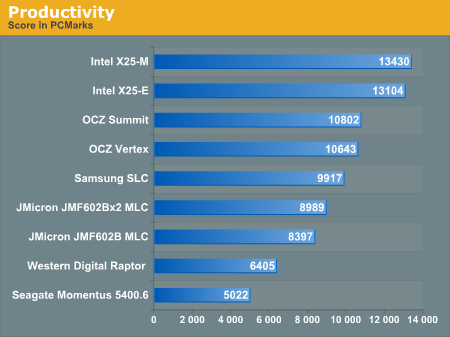
The results here are the best characterization of my personal experience with the drives. The Intel drives are the fastest, a good 25% faster than the Summit or Vertex. Next up are the OCZ drives, with the Vertex dangerously close to the Summit. The older Samsung SLC is next in the standings, followed by the JMicron drives. There's a healthy combination of reads and writes going on here which benefits all of the SSDs, including the less desirable ones.
The final PCMark Vantage suite is HDD specific and this is where you'll see the biggest differences between the drives:
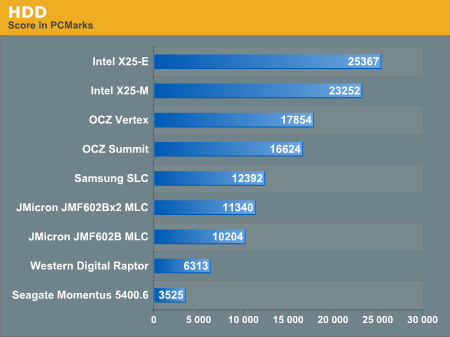
Again we're seeing the sort of breakdown we'd expect. The Intel drives come out ahead, while the Vertex is the best bang for your buck.










250 Comments
View All Comments
Jamor - Wednesday, March 18, 2009 - link
The best tech article I've ever read, and I've read a few.haze4peace - Wednesday, March 18, 2009 - link
Wow, excellent article and so much useful information in an easy to understand way. I have just recently been paying attention to SSDs and thanks to this article I am armed with the information to make the correct choice for my needs. Thanks AnandTech, its the deep and honest articles like these that keep me coming back for more.Alseki - Wednesday, March 18, 2009 - link
I just registered then simply to say, great article. Really informative and enjoyable to read.alexsch8 - Wednesday, March 18, 2009 - link
Anand,Thank you for this article, very informative.
Looking at the example you are giving with your self-manufactured SSD drive: If I save the DOC I use up a page. Based on what you are saying, if I make a change to that DOC, it would then be saved in the next page instead of overwriting the existing page? If that is true, then the File Allocation system (FAT or MFT) itself would contribute quite a bit to the 'filling up of pages' phenomena. Could you elaborate if the proposed file system for SSD addresses this?
Ytterbium - Wednesday, March 18, 2009 - link
Fantastic article, shame that the vendors blacklisted you for telling the truth and OCZ rock for working so hard to address issues.I'll be ordering my Intel SSD soon, I'll defintly consider the Summit when it comes out for my encoding rig as there sequental writes matter to me.
mindless1 - Wednesday, March 18, 2009 - link
Great even, but I've have to disagree with the significance of the passage that suggested the Indilinx controller makes data loss as bad on those SSD as on a conventional hard drive.The primary cause of data loss is mechanical or component failure, not power loss. If we want to consider power loss, it's not just the drive which is prone to lose data, the entire system memory suffers far more data loss than that.
Further, a sufficiently sized supercapacitor should keep the drive operating for a period of time beyond when the rest of the system would be operational, it could be sufficient for the controller to finish writing to flash all received data (or just use an UPS, that's what they're for?).
Second, I can't believe that OCZ only tests designs with HDTach and Atto, I think it more likely they knew of the problem but didn't expect anyone to find it so quickly, and felt the higher sequential speeds made it more marketable. This makes me feel that manufacturers, then online sellers should differentiate their drives with a standardized random read/write score.
What would be really nice is if the Indilinx based SSDs had an application available, similar to a HDD acoustic management bit changing app, that lets the owner set their own preference for IO versus sequential read performance.
gomakeit - Wednesday, March 18, 2009 - link
This is by far the BEST article on SSD I've ever read! Great job anand and yes I read every single word of it!MagicPants - Wednesday, March 18, 2009 - link
Don't they ever try using their own devices? One second of latency should slap any user in the face. It should be very easy for a manufacturer to build a system with their new technology put it in front of people and see what happens, but apparently they're not doing this.They wait for reviewers to do the work for them and then get upset when they find a problem.
What the manufacturers should be taking away from this article is:
1) Try your competitor's products
2) Try your own products
3) Try them in real life as opposed to synthetic tests
4) Compare everything you've tried and market the performance that matters
7Enigma - Thursday, March 19, 2009 - link
But that would make sense....and we know marketing rarely does.paulinus - Wednesday, March 18, 2009 - link
That art is great. Finally someone done ssd test's right, and said loud what we, customers, can get for that hefty pricetags.I've supposed that only choices are intel and new ocz's. Now I know, and big kudos for that.
Just need a bit more $$ for x25-m, it'll be ideal for heavy workstation use, and biggest vertex'll replace wd black in my aging 6910p :)